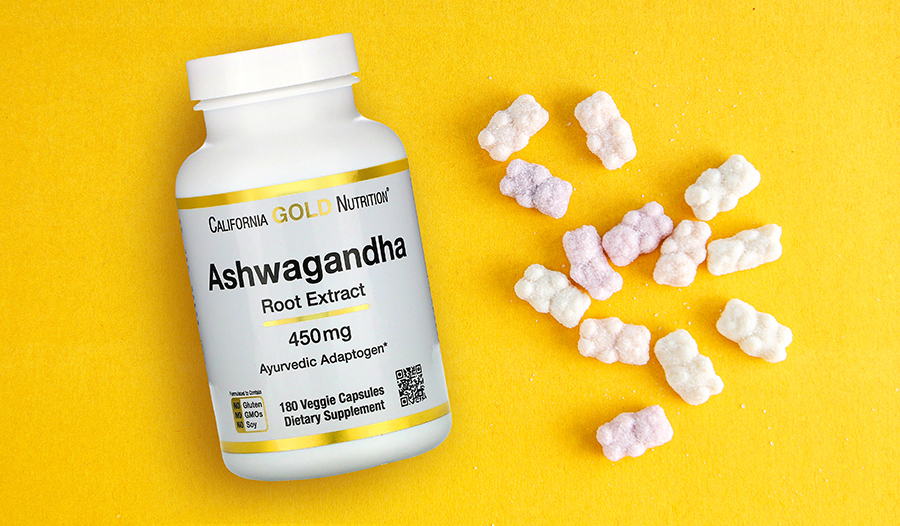Ashwagandha Gummies Are Trending:Here Are 4 Powerful Benefits

Who doesn’t love gummies, especially when they are power-packed with the amazing herb ashwagandha? Gummies represent one of the easiest ways to take your supplements while letting you have a tasty treat without the guilt. When it comes to gummies, ashwagandha gummies are the latest thing you do not want to miss!
Here’s why.
What is Ashwagandha?
If you’ve ever been interested in herbal medicine, stepped foot into a health food store, or went on an online herbal shopping spree, then there’s no doubt that you’ve heard of ashwagandha. Ashwagandha goes by a few different names, like Indian ginseng and winter cherry, but its official scientific name is Withania somnifera. Ashwagandha describes an unassuming small evergreen bush with roots that pack a powerful punch. The plant roots yield profound health properties, and most ashwagandha supplements come from the plant root. Ashwagandha is indigenous to India, northern Africa, and the Middle East, but it can be grown in moderate climates globally.
This miracle plant is a member of the Solanaceae or Nightshade family. This family includes many fairly common plants like tomatoes, potatoes, and eggplants, but there’s nothing common about ashwagandha. This popular herb has some amazing properties.
Ashwagandha Is a Power Adaptogen
Ashwagandha usually gets categorized as an adaptogen. Adaptogens are herbs that help the body resist the damaging effects of stress while promoting normal body functions and processes. Adaptogens, like ashwagandha, can prove beneficial in strengthening the body in the face of stressors like a demanding job, overbearing boss, or intense exercise.
Adaptogens help to protect the body against the damaging effects of chronic stress.
It seems like everyone is a little (or a lot) more stressed these days, but that doesn’t make stress any less harmful. The effects of chronic stress can’t get overstated. Long-term stress usually gets linked to a host of health problems like headaches, poor quality sleep, anxiety, depression, weight troubles, and memory impairment.
Due to the detriments long-term stress can have on the body, taking adaptogens like ashwagandha can help the body handle and reduce stress more effectively.
Studies suggest that the adaptogenic effects of ashwagandha result from activating special proteins called heat shock proteins that protect against cell damage. They also improve cell energy production by increasing adenosine triphosphate (ATP) production, preventing cell death, and improving immune system function.
Ashwagandha May Help Reduce Anxiety
Research shows that ashwagandha can be very beneficial for those suffering from anxiety. One study found ashwagandha to help improve episodes and anxiety at a greater rate than placebo or psychotherapy alone.
Other studies suggest that ashwagandha lowers morning cortisol levels in addition to reducing high-stress levels. Cortisol is a steroid hormone produced by the body in response to stress. One of its primary functions is to increase blood glucose or blood sugar levels while suppressing nonessential functions, preparing the body for a flight-or-fight situation. High cortisol levels are often associated with unpleasant conditions such as higher rates of abdominal fat deposition, insulin resistance, and obesity.
Ashwagandha May Support Thyroid Health
While ashwagandha can help to reduce stress levels, that’s only one of its many benefits. Studies have suggested that ashwagandha can boost thyroid health by improving hypothyroidism or low thyroid function. One study followed participants who suffered from subclinical hypothyroidism (a form of low thyroid function that often precedes overt low thyroid function) and compared those using ashwagandha against those taking a placebo.
Those who took ashwagandha had significant improvement in their thyroid function compared to those in the placebo group. Other studies suggest that ashwagandha increases thyroxine or T4 levels in the body. T4 is the biologically inactive form of thyroid hormone. That means that T4 doesn’t have a discernible effect on the way the body functions. Instead, T4 then gets transformed into triiodothyronine or T3, the biologically active form of thyroid hormone that interacts with and influences the body. Thyroid hormones play a critical role in overall health. For example, they contribute to metabolism, digestion, bone health, muscle function, and even brain function. Ashwagandha can have an advantageous effect on the body.
While improving thyroid function is quite impressive, ashwagandha also gets studied for its effect on improving cognitive or brain function. Research shows that ashwagandha may help improve attention, reaction time, and even executive function. Executive functioning refers to the mental ability to have flexible thinking, planning, and self-control, along with other cerebral skills.
Ashwagandha May Help with Weight Loss
There’s also evidence that ashwagandha may help with weight management. Research indicates that ashwagandha helps to improve body mass index (BMI) and total weight gain. It is thought to do this by fighting inflammation, decreasing unhealthy food cravings associated with stress, and increasing energy levels.
With ashwagandha having so many benefits, what’s not to love? But why are ashwagandha gummies the latest thing?
It’s because gummies offer one of the simplest forms of supplements with unmatched convenience! Gummies eliminate the need for measuring or cleaning up a mess like there is with powders. They’re usually easy to ingest, which dismisses the need for a glass of water to swallow a capsule or a tablet. Plus, they taste good!
Gummies are in that almost magical category of something that simultaneously tastes good while being good for you! You’ll have no guilt downing your daily dose of healthy gummy goodness when taking your supplements in gummy form. That definitely can’t be said for other sweets like candies that offer only empty calories.
Plus, evidence suggests that supplements in gummy form can be just as bioavailable:the amount of supplement or substance that gets into the bloodstream for the body to use once a supplement is ingested:if not more than capsules. One study suggested that vitamin D gummies were much more bioavailable than vitamin D tablets of the same dose.
Another reason ashwagandha gummies are up and coming is that they help get a more therapeutic dose of the herb into the body. Sometimes this isn’t possible when just taking the herb itself or a capsule form of the herb.
Takeaway
Ashwagandha gummies are a great and easy way to get the health benefits of this herb. When you combine the potential health benefits of ashwagandha and the convenient guilt-free tastiness of gummies, you just can’t go wrong!
References:
- Panossian A, Wikman G. Effects of Adaptogens on the Central Nervous System and the Molecular Mechanisms Associated with Their Stress-Protective Activity. Pharmaceuticals (Basel). 2010;3(1):188-224. Published 2010 Jan 19. doi:10.3390/ph3010188
- Pratte MA, Nanavati KB, Young V, Morley CP. An alternative treatment for anxiety: a systematic review of human trial results reported for the Ayurvedic herb ashwagandha (Withania somnifera). J Altern Complement Med. 2014;20(12):901-908. doi:10.1089/acm.2014.0177
- Lopresti AL, Smith SJ, Malvi H, Kodgule R. An investigation into the stress-relieving and pharmacological actions of an ashwagandha (Withania somnifera) extract: A randomized, double-blind, placebo-controlled study. Medicine (Baltimore). 2019;98(37):e17186. doi:10.1097/MD.0000000000017186
- Incollingo Rodriguez AC, Epel ES, White ML, Standen EC, Seckl JR, Tomiyama AJ. Hypothalamic-pituitary-adrenal axis dysregulation and cortisol activity in obesity: A systematic review. Psychoneuroendocrinology. 2015;62:301-318. doi:10.1016/j.psyneuen.2015.08.014
- Sharma AK, Basu I, Singh S. Efficacy and Safety of Ashwagandha Root Extract in Subclinical Hypothyroid Patients: A Double-Blind, Randomized Placebo-Controlled Trial. J Altern Complement Med. 2018;24(3):243-248. doi:10.1089/acm.2017.0183
- Gannon JM, Forrest PE, Roy Chengappa KN. Subtle changes in thyroid indices during a placebo-controlled study of an extract of Withania somnifera in persons with bipolar disorder. J Ayurveda Integr Med. 2014;5(4):241-245. doi:10.4103/0975-9476.146566
- Ng QX, Loke W, Foo NX, et al. A systematic review of the clinical use of Withania somnifera (Ashwagandha) to ameliorate cognitive dysfunction. Phytother Res. 2020;34(3):583-590. doi:10.1002/ptr.6552
- Choudhary D, Bhattacharyya S, Joshi K. Body Weight Management in Adults Under Chronic Stress Through Treatment With Ashwagandha Root Extract: A Double-Blind, Randomized, Placebo-Controlled Trial. J Evid Based Complementary Altern Med. 2017;22(1):96-106. doi:10.1177/2156587216641830
- Wagner CL, Shary JR, Nietert PJ, Wahlquist AE, Ebeling MD, Hollis BW. Bioequivalence Studies of Vitamin D Gummies and Tablets in Healthy Adults: Results of a Cross-Over Study. Nutrients. 2019;11(5):1023. Published 2019 May 7. doi:10.3390/nu11051023
DISCLAIMER:This Wellness Hub does not intend to provide diagnosis...
















































































 Table of Contents
Table of Contents


